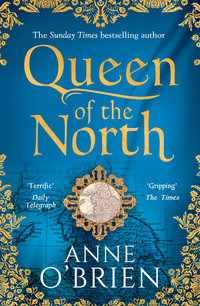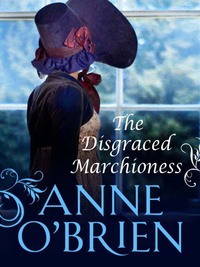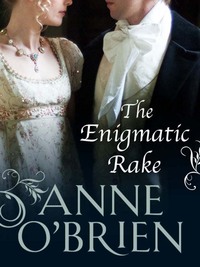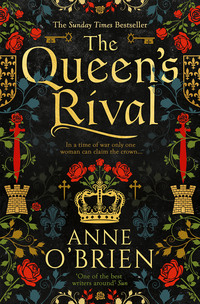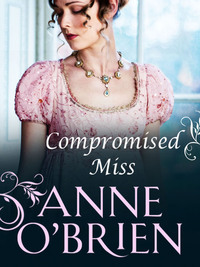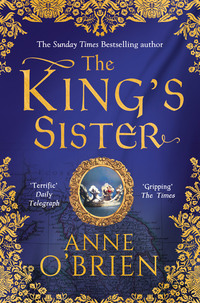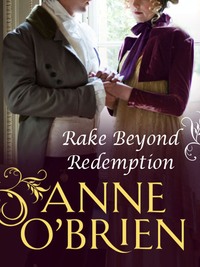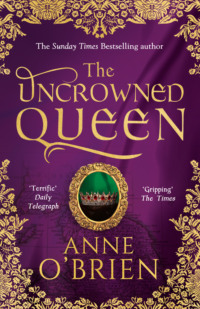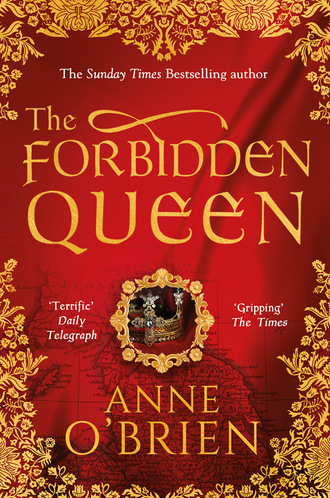
Полная версия
The Forbidden Queen
How could a child, who had never tasted the warmth of her mother’s arms or the casual affection of a father, or even the studied care of a governess, understand the power, the delights of love given freely and unconditionally? I did not know love in all its intricacies.
All that was made plain to me in those years was that to keep my feet on a narrow path and obey the dictates of those in authority over me earned me recognition and, very occasionally, praise.
‘I hear that you have learned to play the lute with some minor skill,’ the Prioress observed.
‘Yes, Mother.’ I flushed with pleasure.
‘That is good.’ She eyed my heated cheeks. ‘But pride is a sin. You will say three Aves and a Paternoster before Vespers.’
If I tried hard enough to follow the rules, to live as good a life as the Prioress expected, would I not become a creature worthy of love? Perhaps my father the King would recognise me and lavish affection on me. Perhaps the Queen would grow to love me and smile on me. Perhaps someone would rescue me from Poissy so that I might live as a Valois princess should live, to my immature mind, wrapped around with luxury, with silk robes and a soft bed.
I could never control my dreams of a better future. My heart remained a useless, tender thing, yearning for love, even when my childish dreams of rescue came to naught. For no one came to release me from my convent cell. No viable husband appeared on my horizon, however obedient I might be.
I did not see the Queen again for more years than I could count.
Then, when I was nearing my fifteenth year, Isabeau, our unpredictable and absent mother, found her way back to Poissy. I was summoned to her presence, where I went, drawing on all my hard-learned composure. I no longer had Michelle, now wed to our Burgundian cousin, to stand at my side, and regretted it.
‘You have grown, Katherine,’ she observed. ‘In the circumstances I suppose I must open my coffers for some new garments for you.’
Her gaze travelled over me, from the coarse cloth that strained over my developing body down to the well-worn leather on my feet. Voluptuously plump, her own extravagant curves clothed in silk and damask, the Queen’s mouth tightened at the prospect of spending money on any project not for her own pleasure. But then, startling me, she smiled, stepped close and took my chin in her hand, to lift my face to the weak light struggling through the high window slit in the nuns’ parlour.
I tried to bear her firm grip and close scrutiny with an inner calm I did not possess. I found that I was holding my breath. Certainly I dared not raise my eyes to her face.
‘How old are you now?’ she mused. ‘Fourteen? Fifteen? Almost a woman grown.’ Now I risked a glance. Isabeau had pursed her lips, eyes, always speculative, taking assessment of my features, as her fingers combed through a lock of hair that had strayed from my coif. ‘Your features are pure Valois. Not bad on the whole. There is elegance about you I would not have expected.’ She smiled a little. ‘The colour of your hair is mine—spun gold—and perhaps your nature too will be mine. Should I pity you or commend you?’ Her eyes sharpened. ‘Yes, it is time that you were wed. And I have a husband in mind for you, if I can catch him and hold him tight. What do you think of that?’
A husband. My eyes widened, a little weight of anticipation settling in my belly like a cup of warm ale on a frosty morning, but since it was entirely a surprise, I could not say what I thought about it. I had expected it, prayed for it to happen one day, but now that the moment had come…
‘Do you ever have anything to say, Katherine?’ Isabeau asked caustically.
This I considered unfair, since she had had no occasion to ask my opinion on any matter since the day she had delivered me to Poissy. Not that I would dare to give it.
‘I would like to be wed,’ I managed, as a dutiful daughter must.
‘But will you make a good wife? You should be perfect for my purposes. You’re pretty enough, your blood is Valois, you’re well formed and there’s nothing to suggest that you will not be fertile,’ she mused as my cheeks flushed. ‘It is unfortunate, of course, that he has refused you once.’
‘Who has refused me, maman?’
‘That blood-drenched butcher Henry.’
I blinked, all attention. All shock.
‘Henry of England,’ Isabeau retorted, as if I were ignorant rather than astonished. ‘Your dowry wasn’t good enough, high enough, rich enough, for his august consideration.’
This robbed me of all responses. The weight in my chest became a flutter of nerves. I had been offered to the King of England, my dowry negotiated and my hand rejected. All without my knowing.
‘The question is, can we change his mind?’ She released me with a snap of her fingers as if she might magic some solution from the cold room.
I was free to step back, away. And did so, but found the words to ask, ‘Does he still consider me, if he has refused me once?’
‘He wants France,’ Isabeau responded willingly enough, as if pleased to have an audience, but the sneer in her voice put me in my place. ‘It wasn’t enough for him to drain our lifeblood at Agincourt. He wants France for himself and his heirs, by some ancient line of descent from his long-dead Valois ancestress Isabella, who wed an English king.’ She turned her stare back on me. ‘He offered to wed you but only on condition that you came with two million gold crowns sewn into your shift as your dower. Two million.’
So much. My breath slammed into my throat. I could not imagine so many gold coins.
‘Am I worth so much, maman?’ It was beyond belief to me.
‘No. Of course you are not. We offered six hundred thousand crowns, and told the English King he was lucky to get as much, considering the state of our finances. So he demanded eight hundred thousand, and a trousseau, but no less. And that was the end of that. We haven’t got it, and the King is too witless to be able to don his own hose, much less debate a treaty.’
‘So he does not want me.’ My hopes, once soaring, now dipped like a summer swallow. ‘I will not be Queen of England.’
‘You might if we are able to remind him of your existence. So how do we remind your prince, ma petite?’ Her endearment might be tender but her tone was brittle mockery as she grasped my shoulders and forced me to face her. ‘Do we trail you onto a battlefield, so that he might catch a glimpse of your qualities as his sword cuts a vicious path through our French subjects? Or do we exhibit you at a siege, where he can peruse a possible bride on his right while he starves our people to death on his left?’ She released me abruptly.
‘Sometimes I see no way forward with such a man. But I must be persuasive. We need him. We need him in an alliance with Valois against those who would reduce France to civil war. And perhaps I see a way. We could send him a portrait, so that he can see your prized Valois features for himself, before his eye begins to stray elsewhere.’ Isabeau tapped a foot as her gaze once more rested thoughtfully on my face.
Her words sank deep into my mind. If Henry of England looked elsewhere for a bride, what would become of me? The enclosing walls of Poissy loomed higher and colder. Marriage to even a hostile suitor, a man who had spilled French blood without compunction on the battlefield at Agincourt, would have something to recommend it, especially if he were a King and rich. And so I was brave—or desperate—enough to take hold of Isabeau’s trailing gilt-embroidered sleeve.
‘It would please me to wed Henry of England,’ I heard myself say. Even I heard the desperation in my voice. ‘If you could remind him of my existence.’ I swallowed hard as I saw the disdain for my naïvety in Isabeau’s eyes. And without thinking I asked the question that leapt into my mind. A young girl’s question. ‘Is he young?’ And then another. ‘Is he good to look at?’
Isabeau shook my hand from her sleeve and walked towards the door, her skirts making a brisk hush of displeasure against the bare boards, so that I regretted my failure to guard my words.
‘Foolish questions. You are too importunate, Katherine. No man will wish to wed a woman who steps beyond what is seemly. The King of England will want a quiet, biddable girl.’ Her lips stretched from elegant moue to implacable line as she considered. ‘But perhaps I will send a portrait, and perhaps the outlay for a competent artist will prove worth the spending.’ Her lips smiled but her eyes acquired a gleam, like a fisherman planning to outwit a pike that had run him ragged for far too long.
‘Perhaps all is not lost and we can still shackle Henry to our side. You might still be the keystone in our alliance, ma petite Katherine. Yes.’ She smiled, a little more warmly. ‘I will arrange it.’
And she did, whilst thoughts of marriage filled my mind.
Why did I want this marriage so very badly? It was more than wealth and rank. Far more. All I knew was that this marriage would be the opening of a door into another world: a world that could not be worse than the one in which I had lived out my childhood.
In truth, I yearned for affection, for love. Why should I not find it with King Henry of England? I cared not if he was as ugly as the devil or the despoiler of our noble French aristocracy on the battlefield. I would be a wife, and Queen of England, and that must be a blessing. Perhaps he would grow to like me, and I to like him.
‘Don’t give him another thought, Kat,’ Michelle remarked on a visit to me—for she did not forget me in her new role of Duchess of Burgundy. ‘You’ve neither seen him nor spoken with him, and he’s twice your age. He only asked for you after he asked for our sister Isabella. And then Jeanne. And even Marie.’ Michelle ticked the names of our sisters off on her fingers with cynical precision. ‘How did I manage to escape? Perhaps he did not realise I existed. And now I am no longer available.’ Her face was stern with her warning.
‘Face it, Kat. Any daughter of France would do for him. It is not a matter of love, but of vainglory. Rejected by Isabella and Jeanne and Marie, conceit will not allow him to be slighted again. That’s the only reason he persists—and you are the only princess left.’
There was no arguing against that, but still I clutched at a golden future.
‘He’ll forget all about you as soon as another candidate is paraded before him.’ Michelle completed her destruction. ‘He’ll not see you, will he, shut away in this place? And even if he did, you’re not a desirable object. If we can’t offer a dowry closer to the two million gold crowns he demanded, he’ll see you as little better than a beggar and reject you out of hand—again. You’ll have Isabeau shrieking at you before long that you are of no value to her.’
I sighed, but continued to hug my long-cherished hopes close in the dark hours, where they began as a bright beacon on a hilltop, but gradually dwindled to a weakly flickering candle flame as the weeks passed and there was no news. Forlornly I considered my situation. Isabeau would be angry because I had failed to catch Henry’s interest. Even worse—far, far worse to my mind—was the thought that Henry did not want me. It seemed that the convent doors were preparing to slam shut, to close me in for ever.
To my relief Isabeau did not descend on Poissy to vent her fury, but the portrait did. I saw it, because Michelle brought it to me, before it was swathed in soft leather to protect it from weather and sea water on its journey, and was truly appalled. The artist was either lacking in talent or had been paid too little. The long Valois features were there right enough, and not beyond liking, for my oval face was not uncomely, my neck had a certain poise. But my lovely hair was completely bundled up and obscured by a headdress with padded rolls over deep crispinettes, the whole structure made complete with a short muslin veil that neither flattered nor seductively concealed. As for my skin, always pale, it had been given more than a touch of the sallow. My lips were a thin slash of paint and my brows barely visible.
Michelle gasped.
‘Is it so bad?’ I asked uncertainly, knowing that it was.
‘Yes. Look at it!’ She stalked to the window embrasure and held up the offending article. ‘That ill-talented dabbler in paint has made you look as old as our mother. Why couldn’t he make you young and virginal and appealing?’
I looked at it through Michelle’s eyes rather than my own hopeful ones. ‘I look like an old hag, don’t I?’ My silent plea to the Virgin was impassioned.
Holy Mother. If Henry of England does not like my face, may he at least see the value of my Valois blood.
And how did my erstwhile suitor receive my portrait? I never knew, but I was informed by the Prioress that my days at Poissy were numbered.
‘You will leave within the month.’ Great-Aunt Marie’s manner was no more accommodating than on the first day that I had stepped over the threshold. But I no longer cared. That new life was approaching fast.
‘Yes, Mother.’
‘King Henry has made a vow to wed you.’
‘I am honoured, Mother.’ My voice trembled as I shook with a new emotion.
‘It is a political alliance. You must play your part to chain Henry to Valois interests.’
‘Yes, Mother.’ One day soon I would wear fur-edged sleeves far richer than those of Great-Aunt Marie.
‘I trust that you will take to your marriage the attributes you have learned here at Poissy. You training here will be the bedrock on which to build your role as Queen of England.’
‘Yes, Mother.’
Bedrock. Role. Chaining Henry to Valois interests. It meant nothing to me. I could barely contain my thoughts, or the smile that threatened to destroy the solemnity of the occasion. I would be a bride. I would be Henry’s wife. My heart throbbed with joy and I hugged Michelle when next I could.
‘He wants me! Henry wants me!’
She eyed me dispassionately. ‘You are such a child, Katherine! If you’re expecting a love match, it will not happen.’ Her voice surprised me with its harshness, even when, at the distress she must have seen on my face, her eyes softened. ‘We do not deal in love, Katherine. We marry for duty.’
Duty. A cold, bleak word. Much like indifference. Foolish as it might be, I was looking for love in my marriage, but I would not display my vulnerability, even to Michelle.
‘I understand,’ I replied solemnly, repeating the Prioress’s bleak words. ‘Henry will wed me to make a political alliance.’
And in truth doubts had begun to grow, for there had been no gifts, no recognition of King Henry’s new-kindled desire for me as his wife, not even on the feast of St Valentine when a man might be expected to recall the name of the woman he intended to wed. There were even rumours that he was still looking to the royal families of Burgundy and Aragon, where there were marriageable girls on offer. How could that be? I think I flounced in sullen misery. My Burgundy cousins, the daughters of Duke John, were inarguably plain, and surely the Aragon girls could not be as valuable as I to the English King’s plans to take Europe under his thrall.
I offered a fervent rosary of Aves and Paternosters that the portrait had been more flattering than I recalled to fix me in his mind, and that he would make his choice before I became too old and wizened to be anyone’s bride. Before I became too old to covet sleeves edged with finest sables.
‘Is the English King young? Is he good to look at?’ I had asked the Queen.
Now I knew.
King Henry took my breath. I saw him before he saw me. King Henry the Fifth of England, in all his glory. There he stood, alone in the very centre of the elaborate pavilion, quite separate from the two English lords who conversed in low voices off to one side. Oblivious to them, and to us—the French party—hands fisted on his hips and head thrown back, Henry’s eyes were fixed on some distant place in his mind, or perhaps on the spider weaving its web into one of the corners between pole and canvas. He remained motionless, even though I suspected that he knew we had arrived.
For his own reasons, he made no effort to either acknowledge us or to impress us with his graciousness. Even his garments and jewels, heavy with symbolism, were worn with a cold insouciance. Why would he need to impress us? We were the supplicants after all, he the victor.
But what a presence he had. Even the magnificent pavilion with its cloth of gold and bright banners was dwarfed by the sheer magnetism of the man. His was the dominant personality: the rest of us, English and French alike, need not have been there. I was filled with awe. And a bright hope. I had anticipated this meeting for three years. I was eighteen years old when I finally met the man I would wed, if all things went to plan, in that splendid canvas-hung space on the banks of the Seine at Meulan.
On one side of me stood Queen Isabeau, resplendent in velvet and fur, accompanied by a sleek and powerful leopard, a hunting cat and not altogether trustworthy, held on a tight rein by a nervous page. King Henry might not see the need to impress, but Queen Isabeau did.
On my left was my second cousin, John, Duke of Burgundy, thus buttressing me with royal power and approval. Duke John was sweating heavily in his formal clothing with its Burgundian hatchings.
My father, who should have led the exchange of offers, was not present, having been deemed mad today, attacking with tooth and nail the body servants who had attempted to clothe him for this occasion. They had given up and my mother had taken command of the proceedings, leaving my father locked in a room at Duke John’s headquarters in Pontoise.
Finally, behind us, filling the entrance to the pavilion, was the necessary pack of soldiers and servants clad in Valois colours to give us some semblance of regal authority, the vividly blue tabards imprinted with enough silver fleurs-de-lys to make my head swim. We needed every ounce of authority we could fashion out of defeat and lure this English king into some manner of agreement before we were entirely overrun by English forces.
And I? I was the tender morsel to bait the trap.
We must have made a noise—perhaps it was the leopard that hissed softly in its throat—or perhaps King Henry simply felt the curiosity of my gaze, for he abandoned the spider to its own devices, turned his head and stared back. His gaze was cool, his face unresponsive to the fact that every eye was on him, his spine as rigid as a pikestaff. And then there was the scar. I had not known about the scar that marked the hollow between nose and cheek. But it was not this that took my eye. It was the quality of his stare, and I felt my blood beat beneath my skin as he made no gesture to respond to our arrival. His appraisal of me was unflatteringly brief, before moving smoothly on to Duke John and Isabeau.
Well, if he would not look at me, I would look at him. I knew he was thirty-two years of age because my mother had so informed me. Much older than I, but he carried the years well. He was tall—taller than I, which I noted with some degree of satisfaction—tall enough to handle the infamous Welsh longbow with ease, a man who would not feel a need to be resentful of a woman who could cast him in the shade. He was fair skinned with a straight blade of a nose.
Surprisingly to me, his physique was slender rather than muscular—I had expected a more robust man for so famous a soldier—but I decided there might be hidden strength in the tapering fingers that were clenched around his sword belt. Did he not have a reputation for knightly skills and personal bravery? And also for exceptional manners, but not at this moment, for the hazel gaze, as bright as a tourmaline, returned and fixed once more on my face. He did not make me feel welcome to this meeting of high diplomacy where my future would be decided. He was assessing me as he might have assessed the merits of a mare for sale.
In that moment it seemed to me that his appraisal and manner were quite as careless of my person and my predicament as Great-Aunt Marie’s.
A little frisson of awareness touched my nape. This was a man with a high reputation, a man who could grind us into dust if he so desired. I must play my part and make an impression as a princess of Valois, even though a breath of fear flirted along the skin of my forearms like summer lightning.
Willing courage into my bones, I locked my eyes with his even as my knees trembled at my presumption, until Duke John cleared his throat, like an order given to commence battle. The two English lords abandoned their deliberations, while Henry turned full face—and Isabeau stiffened at my side. I wondered why, noting the direction of her interest, and that her finely plucked brows had drawn down into the closest she would dare come to a diplomatic scowl.
I followed her stare, curious, and understood. My mother was rigid with fury, not because of the ostentatious wealth of the rubies, as large as pigeon’s eggs in the chain resting on King Henry’s breast and the opulence of the trio of similar stones, blinding in the sun, which he wore on the fingers of his right hand. Not even because of the golden lions of England that sprang from two of the quarters on his heavily embroidered thigh-length tunic, although they were heraldically threatening enough. It was the fleurs-de-lys of France, silver on blue, a mirror image of our own livery, that occupied the two counter-posed quarters on Henry’s impressive chest, shouting to all the world that this man claimed our French Crown as confidently as he claimed his own. He had claimed it before we had even taken our seats to discuss the delicate matter. I had been wrong. He was without doubt here to make an impression after all, but not to win friends, only to ensure that he cowed us into submission before a word had been exchanged.
As I heard Isabeau’s sharp inhalation and saw the barely disguised disdain in her face, I understood that this negotiation might still come to nought. I might still not reach the altar as a bride.
Holy Virgin, let him want me enough to accept a compromise. Let him want me enough to accept my mother’s concessions. Make my mother compliant enough to offer concessions.
The two English lords were approaching.
‘The Duke of Bedford,’ Duke John muttered sourly out of the corner of his mouth. ‘The King’s brother. The other’s the Earl of Warwick—another bloody puissant lord.’
But at least they granted us that belated welcome, speaking in French for our comfort and my unspoken gratitude, for my English was not good beyond commonplace greetings.
Lord John, Duke of Bedford, brother to the magnificent Henry, bowed and introduced us to Henry of England.
‘La reine Isabeau de France. Et sa fille, Mademoiselle Katherine.’
And the Earl of Warwick gestured us forward, his hand hard on the collar of a wolfhound that had taken fierce exception to the presence of the leopard.
‘Bien venue, monsieur, mes dames…’ continued Lord John. ‘Votre presence parmi nous est un honneur.’
A flurry of bowing and curtseying.
‘Bienvenue, Mademoiselle Katherine,’ Lord John encouraged me, smiling with a friendly gleam in his eye, and I found myself smiling back. So this was the Duke of Bedford, whose reputation was almost as formidable as King Henry’s. I liked his fair face and amiable features. I liked it that he had taken the trouble to speak to me and put me at my ease, as much as it was possible, even though my heart continued to gallop.
His brother, the King, took no such trouble. King Henry still did not move, except for a furrow growing between his well-marked brows. So he was frowning at us, and his voice, clear and clipped, cut through the formal greetings.
‘We did not expect you to arrive quite yet.’
And he spoke in English. The frown, I decided, was not for me but for his brother’s kindness. This haughty King intended to speak in English, forcing us to struggle in a language in which not one of us was able to converse equably. He looked us over, chin raised in chilly superiority, while my mother, glorious with a gold crown and jewelled fingers, stiffened even further under the scrutiny. Could my heart beat any harder, without stopping altogether? This was going from bad to worse, and King Henry had yet to exchange one word with me.





